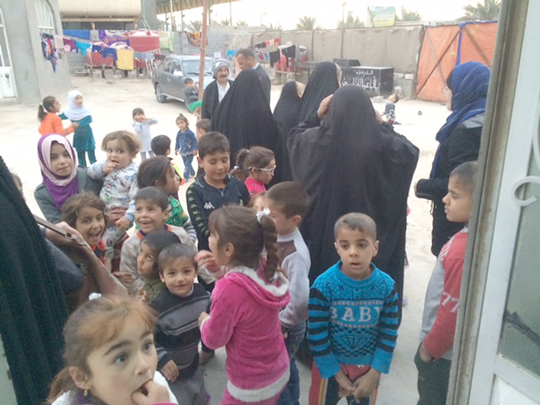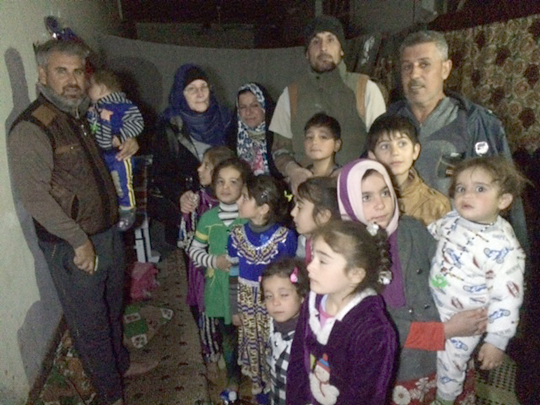Najaf, Iraq – A week has passed since my arrival in Iraq. Once again we come desiring to strengthen the bonds of human friendship, bonds which threaten to break as the opportunities to visit each other become less and less possible.
A few days prior to my departure, I attended a Veterans for Peace holiday party in New York City where I live. Most members of this chapter were in the U.S. military during the Vietnam War. The chapter invited the Vietnamese ambassador to the U.N. to their gathering. In a moving message she stressed that the war has been over for forty years now, and that it was hard to find remnants of the war in her country. "It is hard however for us to forget" she said. "We remember so that it won’t happen again."
Her words struck a deep chord in me, as I would soon be going to a country where the war is far from over. It rages on.
Two days into my trip I was able to visit some of the internally displaced families between Najaf and Karbala. The whole roadside, approximately 70 miles, is filled with displaced families living on either side of the street in empty buildings next to mosques, or in tents and makeshift structures. I remember seeing these conditions on my last trip from Najaf to Karbala in April of 2015. I’ve heard that an estimated 100,000 displaced people are lodged here.
Two young men, members of a group called Moja (which means wave of change) drove us to the displaced families. Moja is a group of over 100 students that formed three years ago in reaction to "the corrupted world around us." Yasser, who graduated from dental school last year, was my translator. As we drove, he began to explain the purpose of Moja. "The country is sick. Moja is a response to fix the ignorance around us, the corruption. It is an act of survival. We have two choices. One is to just watch the country burn and burn, being uninvolved and unconcerned with the issues. Or we can challenge the obstacles facing us. We want to do something. We want to encourage people to read, encourage people to a new awareness."
Moja has sister groups in Baghdad and Mosel. In Najaf, Yassar explained, they had a reading festival, the "I am Iraqi, I read" project. Over 1,000 gathered in a park to read together. "The most important thing is not just reading, it is lowering the level of hatred between Sunni and Shia. Also we have thirty-two female members of Moja. I am very proud of them. They are more important than the male members. Najaf is very conservative. Moja gives them a chance to engage in civil initiatives."
Yassar related how the Moja group in Mosel, primarily Sunni, collected clothes for the needy in Najaf, a Shia city. The clothes arrived in packages that said "from your friends in Mosel."
My heart soared as I listened to this animated young man. I would later learn that just two weeks ago, Moja carried out a project called: "From Najaf, a message to Mosel." Over a three-day period, about 1,000 handwritten letters were gathered from ordinary people in Najaf, on the streets, in the shops, in the universities as well as from professionals and clerics. These letters were handwritten to ordinary people in Mosel, people under siege, and surrounded by ISIS and Iraqi forces. In effect, they told the people not to lose hope. They were dropped from Iraqi Air Force planes over Mosel. Some messages were also filmed and sent over social media. One message was: "Let us think of ways to end this dilemma in Iraq. The enemy is trying to divide us. Let us try to get together as one people who love each other, undivided, trying for a better tomorrow."
It is cold now, two and three blanket weather. Arriving at our destination, we were led into a room in a cement building and invited to sit on thin floor mats forming an L-shape. The room was completely barren except for the mats. There were adjoining rooms, I believe, and the space was shared by 3 different couples with 13 children among them. These families were from Telafar in the north and are of Turkish origin. They had fled Telafar when ISIS took over about three years ago.
They get food rations from the UNCHR, but only rice, oil, sugar and flour. No lentils, tea, dried milk, fresh vegetables, fruit or meat. One of the fathers works in construction when he can get work, maybe 6 days in a 2 month period. He earns $20 a day. It is hard work. Alongside of mosques, the displaced are allowed to live rent free. School is provided in containers, referred to as "caravans." These containers are common among the displaced people throughout Iraq.

Nearby we visited a second set of 3 families. They fled from Mosel and had come 2½ years ago, part of a small Shia population there. Their living space was separated by blankets or large cloths serving as walls. Crowded with an almost total lack of privacy, they face real hardship.
We heard from some families that a government organization provided them with kerosene heaters, but others said they were unable to get on the lists, and had no heaters. Also one set of families told us that a doctor comes around monthly, but others told us they had no health care at all. They need to buy water to drink. This costs about $1 a day in the winter and $3 a day in the summer. The greatest needs were for clothes for the children, blankets, heaters and milk.
With no hope of being able to return to their homes in the near future, and with no place or family to go to, people seem resigned to their fate. "We are sick with pain," one man told us.
Yet signs of hope persist.

Yassar was able to hook one man up with dental care, and he encouraged the families to send their children to the University Dental clinic saying "My colleagues are waiting there for you."
As evening descended, word had spread that we were there. A man with a faulty prosthesis came seeking help. He said he had been hit by a US bomb. Another two men came who’d been injured by car bomb explosions. One soft-spoken gentleman was blinded in one eye and could only ambulate by using a walker. I asked if we could have our picture taken and he agreed. I told him I would tell his story. We could have stayed on and on as people were eager for a visit. When we left, we didn’t feel like strangers. We bade one another heartfelt goodbyes. I felt grateful for being welcomed, and the people we met appreciated that we had listened to them. In each place I assured people that they are not forgotten, that many people want to hear their stories and long to end all wars.
Cathy Breen (newsfromcathy@gmail.com) helps coordinate Voices for Creative Nonviolence.


